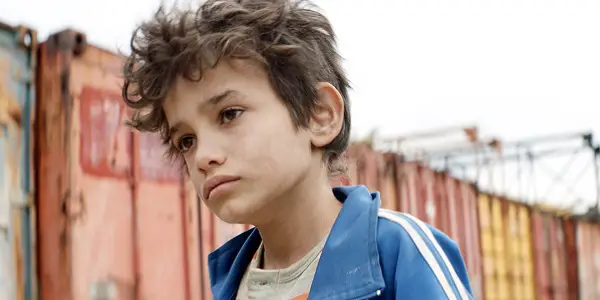The third feature film from Lebanese actress and filmmaker Nadine Labaki and a nominee for Best Foreign-Language Film at this year’s Oscars, Capernaum tells the story of a young boy in the slums of Beirut who sues his parents for bringing him into the world. The boy has been punished for committing crimes, but in his eyes, it is not his fault; rather, it is the fault of parents who couldn’t properly take care of him and his siblings and thus indirectly forced him down a path of desperation in order to survive.
A drama of incredible social realism, Capernaum doesn’t shy away from tackling a variety of heady issues, from poverty to illegal immigration to child marriage. It is not an easy watch, but if you take a chance on it, you’ll be rewarded with one of the most remarkable films of the year.
Early Onset Adulthood
Zain (Zain Al Rafeea, a remarkably charismatic child whose performance has rightfully earned him comparisons to James Dean) lives in a tiny apartment in the slums, overstuffed with members of his ever-growing family; despite their inability to provide even the all-important identity documents for their children, Zain’s parents keep having them. Zain’s beloved older sister is only 12 but already has an adult admirer who hopes to make her his wife. To save his sister from such a fate, Zain goes so far as to help her hide her periods from their parents, knowing that as soon as they see this sign of puberty, she’ll be sent away.

When he fails to protect his sister from becoming a child bride, Zain runs away in a fit of rage and ends up finding refuge with Rahil (Yordanos Shiferaw), an illegal immigrant from Eritrea with a baby that Zain helps care for. However, when Rahil disappears, Zain is forced to take full responsibility for the baby – a hard thing to do when he is a child himself. Little does Zain know, Rahil has been arrested for being in the country illegally, with no means of telling Zain where she is or what to do with her child.
Grounded in Reality
Zain’s decision to bring his parents to court for the crime of bringing him into the world serves as the framing device for this emotional rollercoaster of a story that highlights real issues children are facing around the world. In an interview with Deadline Hollywood following a November screening of Capernaum, Labaki summarized her intention in telling Zain’s story:
“At the end of the day, those children are really paying a very high price for our conflicts, and our wars, and our systems, and our stupid decisions, and governments…I felt the need to talk about the problem, and I was thinking, if those children could talk, or could express themselves, what would they say? What would they tell us, this society that ignores them?”
The message that Capernaum relays is one of anger and injustice, made all the more impactful by Labaki’s almost documentary-style approach to the film. While the framing device of Zain’s lawsuit does feel a bit kitschy at times, the intense realism of the rest of the film more than makes up for it.
Labaki shot for six months with her cast of non-actors; the footage was then edited over a period of two years. Many members of the cast, who were generally found on the streets of Beirut, had literally lived through the situations Labaki asked them to portray on-camera. (Most dramatically, Yordanos Shiferaw, who plays Rahil, was arrested during filming; like her character, her status as a refugee made her vulnerable to the system.) These experiences come through in their performances, infusing Capernaum with raw emotion that makes the film’s punch to the gut hit so much harder than if Labaki had cast a series of glossy professionals.
Zain Al Rafeea, in particular, is a standout, infusing the leading role of Zain with his own sharp-tongued wit and stubborn strength. (He also deserves credit for his preternatural ability to curse like a sailor who has been at sea longer than Al Rafeea has actually been alive.) With wide eyes that convey all of the rage and hope that infuses Zain’s everyday existence, he has a natural presence onscreen that many trained actors would die for. Carrying the film on his startling narrow shoulders, Al Rafeea is the bright light in the center of all of the darkness that Capernaum seeks to illuminate.
Capernaum: Conclusion
Capernaum fuses documentary elements with a fictional narrative to tell one of the most emotionally impactful stories of the year. Nadine Labaki’s unique accomplishment with this film cements her as a director that audiences around the world should be watching to see what she does next.
What do you think? Does Capernaum sound like a deserving Oscar nominee? Share your thoughts in the comments below.
Capernaum was released in the U.S. on December 14, 2018 and will be released in the UK on February 22, 2019. You can find more international release dates here.
Does content like this matter to you?
Become a Member and support film journalism. Unlock access to all of Film Inquiry`s great articles. Join a community of like-minded readers who are passionate about cinema - get access to our private members Network, give back to independent filmmakers, and more.